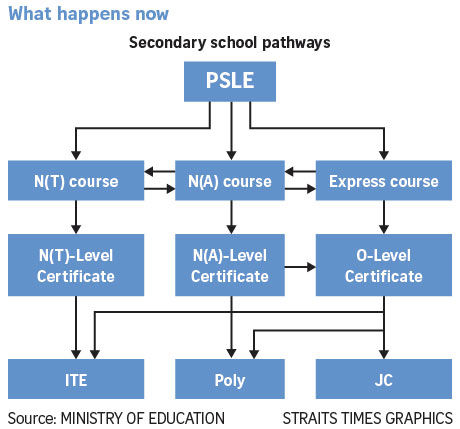Primary 5 pupils to be graded using new PSLE scoring system from next year
- chenlaoshi
- Jul 26, 2019
- 4 min read
发布: 2019年 7月25日
来自: The Straits Times
Starting next year, Primary 5 pupils will be graded with the new Primary School Leaving Examination (PSLE) scoring system to help them come to grips with it.
These pupils will be the first cohort to undergo the new PSLE scoring system in 2021, which grades them on the basis of their individual performance in subjects, regardless of how their peers have done.
The change is a key part of the Ministry of Education's (MOE) efforts in recent years to shift away from an overemphasis on academic results, and provide students with more flexibility and space to develop their strengths and interests, regardless of their starting points.
Pupils will be given Achievement Levels 1 to 8 for each subject in their school examination results, instead of grades A* to E.
When they get to Primary 6 in 2021, they will be given the cut-off entry scores of all secondary schools based on the new scoring system, MOE said on Thursday (July 25).
Entry scores derived from the previous year's posting exercise are typically given to pupils between October and November, but in 2021, they will be released by the middle of the year.

This will give pupils and their parents more time to choose secondary schools.
On paper, this new system with scoring bands is supposed to be less stressful than the current T-score system, as pupils don’t have to chase that last mark to get ahead of their peers.
The MOE also explained how Foundation-level subjects will be scored under the new system and outlined the eligibility criteria for pupils who want to take up higher mother tongue in secondary school.
Scoring of Foundation-level subjects
Under the new PSLE scoring system, each Standard-level PSLE subject will be scored using eight bands known as Achievement Levels (AL) - from AL1, the best score, to AL8.
The total PSLE score will be a sum of the scores for the four subjects, with possible scores ranging from 4 to 32.
Foundation-level subjects - which cover a subset of the curriculum covered at the Standard level for those who are weaker in the subject - will be graded AL A to AL C.

These grades will be pegged to AL6 to AL8 of the Standard-level subjects.
Anticipating parents' questions on why Foundation-level subjects are being pegged to the last three levels of Standard-level subjects, MOE explained that the curriculum of a Foundation-level subject is a subset of the Standard-level subject.
The assessment load at the Foundation level is less demanding when compared against the Standard level, the ministry said.
It revealed that about 10 per cent of PSLE pupils take up at least one Foundation-level subject, and assured parents that it is possible for a pupil to qualify for Express or Normal (Academic) stream even if he takes one or more subjects at the Foundation level.
"Pupils should thus decide whether to take a subject at Standard or Foundation level based on their aptitude and ability to manage the demands of that subject, rather than whether he can still qualify for a particular course," MOE said.
Eligibility for higher mother tongue
To be eligible to take up Higher Mother Tongue in secondary school, pupils would need at least an overall PSLE score of 8.
They can also take up Higher Mother Tongue if they have an overall PSLE score of 9 to 14 and attain AL1 or AL2 in their mother tongue, or distinction or merit in their Higher Mother Tongue at the PSLE.

For those who do not meet the above criteria, secondary schools will continue to have the flexibility to offer Higher Mother Tongue to students if they are assessed to have high ability and interest in mother tongue languages.
This is similar to the existing practice.
MOE said the eligibility criteria take reference from the existing criteria, and are intended to ensure that students can cope with the higher academic load in secondary school.
"The systemic enhancements we are putting in place, including recently announced initiatives, such as the reduction of school examinations and the implementation of full subject-based banding in secondary schools, aim to offer multiple pathways and possibilities for our students with diverse needs to reach their fullest potential, regardless of their starting points," said MOE.
MOE's director-general of education Wong Siew Hoong said MOE will continue to support students, parents, and schools through the changes.
In the next few months, schools will engage pupils and parents, starting from those in Primary 4, to guide them in making decisions on subject choices for the PSLE at the end of the year.
Madam P. Saras, 41, who has a daughter in Primary 3, was surprised at Foundation-level subjects being pegged so low.
"I know at Foundation level, much less of the curriculum is covered. But I wonder if it needs to be dumbed down so much for the weaker pupils."
But the former teacher appreciates MOE's plan to help pupils and parents get used to the new measures.
"Like most parents, I am anxious as well about the new scoring system and how it will affect my daughter. It helps to get started on it early."



Comments